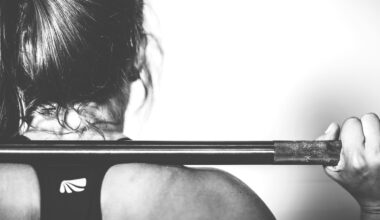Avoiding GI Distress Through Proper Nutrition in Triathlons
For triathletes, achieving peak performance hinges significantly on smart nutrition choices. Gastrointestinal (GI) distress can derail training and competition. To conquer this, athletes must learn to nourish their bodies appropriately before and during races. Initially, it’s crucial to identify potential triggers by experimenting during training sessions, as they provide a controlled environment to pinpoint what works and what doesn’t. One of the best strategies is to consume easily digestible foods that don’t weigh down the stomach. This includes simple carbohydrates, such as energy gels or bananas, that break down quickly. Moreover, hydration plays an essential role in digestion as well; athletes should maintain optimal fluid levels to support nutrient absorption and gastrointestinal function. Consuming small amounts frequently, instead of large meals, reduces the risk of discomfort. It’s also beneficial to avoid high-fiber and fatty foods, which can exacerbate GI issues during intense physical activity. By ensuring proper nutrition, triathletes can mitigate the risk of GI distress and enhance their overall performance on the day of competition. Proper nutrition becomes a critical ally in achieving triumph over these challenges.
Understanding your body’s nutritional needs is vital, especially in triathlon training. Each stage of the race – swimming, cycling, and running – can demand different fuel sources. Exploring these demands ensures that triathletes can manage their energy levels properly. Before training sessions, a targeted diet rich in carbohydrates helps replenish glycogen stores, prepping muscles for exertion. During the event, lightweight and high-energy sources such as electrolyte-rich drinks or energy bars can maintain performance. After training or races, recovery nutrition becomes key due to the potential for muscle breakdown. Consuming protein as part of a post-exercise meal aids in muscle repair. Balancing macronutrients—carbs, proteins, and fats—ensures that the body receives requisite energy and nutrients. It’s equally important to consider meal timing; for optimum results, food should be consumed at specific intervals to avoid energy dips. Athletes need to personalize their nutrition strategies based on individual tolerance levels and preferences. Seeking guidance from a sports nutritionist can also greatly enhance an athlete’s ability to perform effectively while avoiding any significant gastrointestinal discomfort.
Nutritional Strategies for Race Day
On race day, triathletes should have a clear eating strategy to minimize GI distress. Pre-race meals must consist of simple, carbohydrate-rich foods to ensure energy without upsetting the stomach. It’s advised that triathletes eat 3-4 hours before the race begins to allow for optimal digestion. Staying hydrated is equally critical, especially when nervousness and adrenaline can sabotage fluid intake. Athletes can carry water or electrolyte drinks during the bike and run segments for continual hydration. During the race, it’s important to consume small quantities of food or energy gels every 30-45 minutes, balancing quick carbohydrates with hydration. Precisely timing these intakes can minimize the chances of GI upset. Offering former competitors’ insight as knowledgeable input can also help reduce anxiety associated with race day nutrition. Learning from common mistakes made by seasoned triathletes can provide valuable perspectives. Monitoring symptoms can lead to better-informed choices, transforming hurdles into opportunities for growth. Therefore preparing a race-day nutrition plan is just as critical as training, ensuring triumph is achievable through the right dietary approach.
Another significant aspect of triathlon nutrition is the choice of sports drinks and food during training. Athletes often experiment with different brands and formulations to find the ideal mix that minimizes GI troubles while maximizing energy. Look for products labeled as ‘low osmolality,’ designed to be kinder on the stomach. These beverages typically provide a balanced profile of electrolytes, carbohydrates, and hydration. The combination of carbs and electrolytes helps maintain performance without causing stomach cramps. Triathletes should sample different products during training, assessing their body’s reactions. Combining sports drinks with gels can also offer diversification in energy sources. Recognizing that taste matters, athletes must choose flavors they enjoy, which encourages more frequent intake during grueling race conditions. Tropical flavors may be enticing, but they aren’t always gentle; testing flavors and textures is essential. Practicing ideal fueling strategies ensures athletes are fully prepared mentally and physically when race day arrives, paving the way for success while avoiding gastrointestinal distress. Each athlete’s body is unique, and personal preferences dictate effective race nutrition strategies.
The Importance of Hydration
Hydration is a key player in preventing GI distress during triathlons. Dehydration can have immediate negative effects including stomach cramps and reduced performance. It’s important to fluid levels before, during, and after training sessions. Tailoring fluid intake to environmental conditions, like heat or humidity, can yield significant dividends. Electrolyte balance in beverages can also help, as it replaces losses during sweating. Consuming water alone might not suffice, especially in longer races where sodium depletion can occur. Finding a balance between water and electrolyte drinks is essential for performance. Moreover, monitoring urine color can serve as a daily guide: a pale yellow indicates sufficient hydration, while darker shades denote a need for increased fluid intake. Consistent hydration habits lead to better performance outcomes. Athletes should gradually condition their stomachs to tolerate fluids during activities to prevent sudden GI issues on race day. Adopting a strategic approach to fluid intake can ultimately set an athlete up for success. Proper hydration coupled with strategic food intake supports optimal physiological functions during intense competitions.
Beyond hydration, understanding digestive health plays a vital role in avoiding GI distress during triathlons. Gut health influences nutrient absorption, energy distribution, and overall performance. Triathletes must incorporate probiotics into their routines, which can strengthen digestive function. Consuming yogurt or fermented foods can help create a healthier gut environment. Additionally, managing stress through techniques like deep breathing can promote better digestion. High levels of stress can contribute to GI complications and discomfort. Observing how various foods affect digestion can lead athletes to create a personal database of what helps or hinders their performance. Keeping a food diary to track meal timings, portion sizes, and symptoms can help identify effective foods. Engaging with a nutritionist to develop an individualized plan fosters better digestive health. Furthermore, the importance of adequate sleep also cannot be underestimated, as restorative sleep significantly impacts digestive efficiency. Ensuring a balance of physical training and recovery provides key insights for sustained performance. Collectively, focusing on gut health can lead to improved outcomes during challenging race conditions.
Long-term Nutrition Planning
Long-term nutrition planning is essential for triathletes aiming for consistency and performance. Assessing dietary patterns over time ensures that athletes recognize what works and what needs to be adjusted. Developing a nutrition strategy that accommodates seasonal variations in training volume is crucial. For example, during peak training periods, increasing caloric intake helps maintain energy levels and enhance recovery. Conversely, in off-seasons, a slight reduction may be necessary to manage weight effectively without compromising performance for upcoming competitions. Varying macronutrient ratios seasonally can nurture both endurance and muscle recovery, while also combating GI distress in the process. Exploring meal prepping strategies enables athletes to stay committed to their nutritional goals amidst demanding schedules. Preparing balanced meals in advance can eliminate the temptation for unhealthy choices during hectic days. Access to nutritious snacks on the go can also extinguish cravings for unhealthy options. Triathletes should embrace a lifestyle that supports consistent eating habits and avoid drastic changes, as this could spark unexpected GI problems. Each conscious decision about nutrition can be pivotal during a triathlete’s journey.
In conclusion, navigating proper nutrition is crucial to avoiding gastrointestinal distress in triathlon. Successful athletes prioritize experimenting with various foods and fluids during the training phases to develop personalized nutrition strategies. Active management of hydration and gut health combined with long-term nutritional planning drives success. Moreover, self-awareness regarding which food types suit them fosters optimal performance. Implementing these strategies enhances athletes’ abilities to handle the challenges presented during competitions. Engaging with seasoned triathletes’ knowledge and seeking guidance from sports nutrition professionals amplifies understanding and effectiveness. Each of these well-informed choices enables triathletes to focus on their performance without the cloud of GI distress. Embracing nutrition as a powerful facet of training equips athletes with a key advantage. Leading up to a race, effective pre-race nutrition planning becomes as crucial as physical training. With well-crafted dietary choices, triathletes can feel confident that they are setting themselves up for success, whether in training or competition. Ultimately, refined nutrition strategies serve to enhance performance, reduce discomfort, and empower athletes to achieve their triathlon goals with ease.


